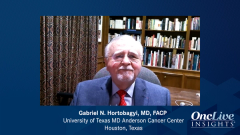
Advances Treating HR+ Metastatic Breast Cancer
Various breast oncologists discuss the potential effect of treatment advances in hormone receptor-positive metastatic breast cancer.
Episodes in this series

Gabriel N. Hortobagyi, MD, FACP: There has been much progress made in the management of hormone receptor-positive metastatic breast cancer and there is much research being conducted to continue to make progress. No. 1, the very encouraging data obtained with CDK [cyclin-dependent kinase]4/6 inhibitors in first, second, and third-line metastatic breast cancer, regardless of menopausal status and endocrine partner, have translated the new development of clinical trials in early breast cancer. There has been a report of 3 separate clinical trials, which are relatively early in their development, with mixed results. Some with positive results and a couple with negative results. But we are waiting for the mature report of the various trials that are focusing on breast cancer. In addition to this, there are other approaches to target the hormone receptor-positive population. We discussed earlier, the targeting of PI3 [phosphatidylinositol 3] kinase as well as AKT [protein kinase B], mTOR [mechanistic target of rapamycin], and the other components of the intracellular signaling pathways. There are also other approaches to combine these specific inhibitors with cell surface growth factor systems, such as insulin-like growth factors, FGF [fibroblast growth factors], and members of the HER [human epidermal growth factor receptor] family. There is going to be a very exciting group of clinical trials occurring in the not too distant future. Another important aspect in research in hormone receptor-positive metastatic breast cancer is the development of selective estrogen receptor downregulators. We have had the benefit of fulvestrant [Faslodex], which is the only selective estrogen receptor downregulator available to us today and approved by regulatory agencies. While fulvestrant is a very effective and extremely well-tolerated drug, it has the inconvenience of being poorly soluble and having to be administered in large volumes as an intramuscular injection. The new selective estrogen receptor downregulators, of which there are at least half a dozen in clinical trials today, are largely administered orally and have already been shown to have therapeutic activity. Whether the therapeutic activity matches or exceeds that of fulvestrant and whether their safety profile can match the high level of safety of fulvestrant remains to be determined by comparative trials. However, there’s much excitement in pairing this selective estrogen receptor downregulators with a variety of other targeted agents such as the CDK inhibitors, PI3 kinase, AKT, mTOR inhibitors, and others.
Sara A. Hurvitz, MD: I’m really looking forward to seeing data regarding the benefits of CDK4/6 inhibitor and the post-progression after CDK4/6 inhibitor setting. I still think a lot of oncologists are switching CDK4/6 inhibitors or switching endocrine partners outside of a clinical trial setting. We don’t yet have data to support this practice. I’m especially intrigued by some data that may indicate abemaciclib [Verzenio] could be used and have efficacy after progression on ribociclib [Kisqali] or Palbociclib [Ibrance]. But I’m looking forward to seeing data from a randomized clinical trial to show what the magnitude of benefit is and what the safety of that approach is.
Aditya Bardia, MD, MPH: I’m excited about the clinical development of various agents for our patients with hormone receptor-positive metastatic breast cancer. We’ve seen that ceiling of 5 years hit with the use of endocrine therapy plus CDK4/6 inhibitor and look forward to moving that through 7-10years and making hormone receptor-positive metastatic breast cancer more like a chronic disease where patients can live with metastatic breast cancer and live well. Quality of life is also a very important component. I look forward to drugs that are safer, less toxic, and can ensure that patients with metastatic hormone receptor-positive breast cancer, despite metastatic disease, can live well.
Transcript edited for clarity.



































